Spotlight on Panos Skoulidas
Oct 16, 2015
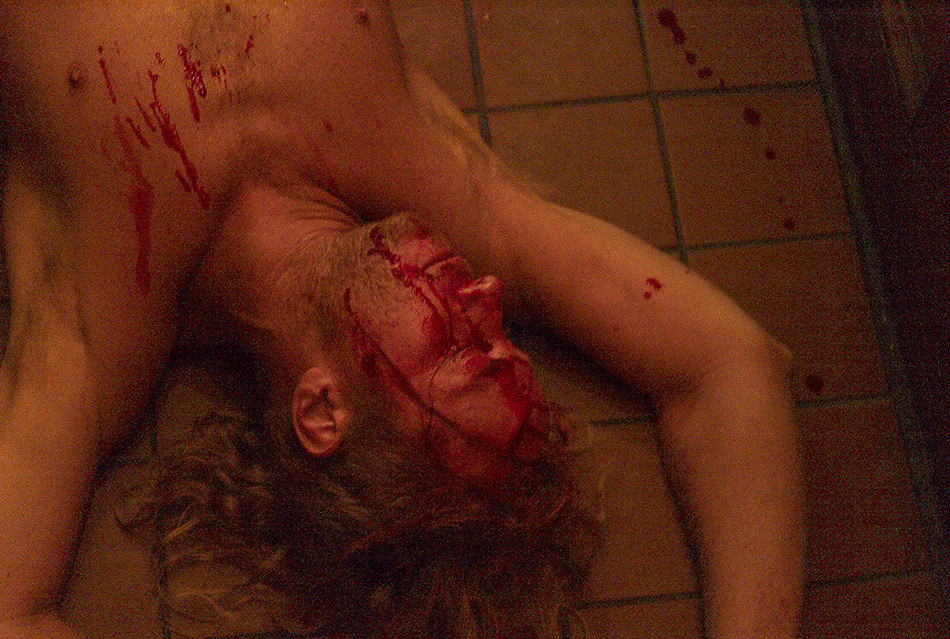
EDITOR'S NOTE:
This week's interview was conducted by Matthew Busch (www.matthewbuschphoto.com). Please note that the images featured here are taken within a context of paticipatory experience, not documentary journalism.
Additionally, the interview in this post is edited from an audio interview for purposes of readibility. If you're interested in hearing the original audio interview, please see below. Thanks, and as always - if you want to do an interview, or have a recommendation, please contact us!
TID:
Tell us a little about the backstory of the book, and the project, that you’re working on.
PANOS:
Venice, it was so rich of pictures, so it didn’t take me so much to realize that it’s a paradise. It’s a sea of photos. And if the the locals accepted you, then you’re allowed to shoot. So I became friends, whatever that means, and drinking a lot at the Bistro. I became friends with this guy, a key guy in the whole story, because he had the keys of Venice. If you would be his friend, then you were inside Yakuza.
TID:
Did you have any challenges when you were taking these types of pictures, or that picture in particular?
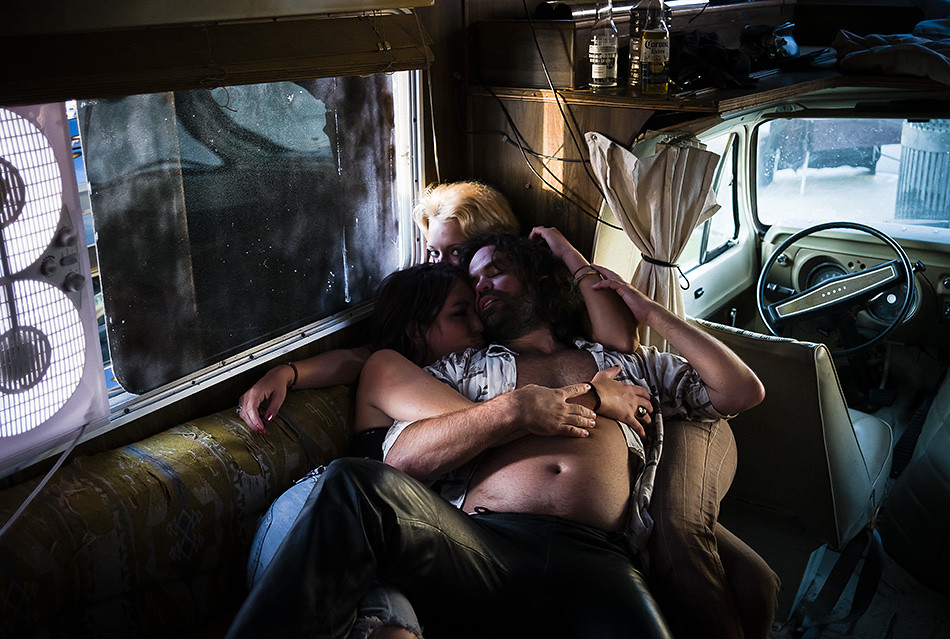
PANOS:
Well that particular afternoon, I don’t remember the date, don’t ask me that, that’s probably around 2008, or 09. I could sense that something was happening with these three, anyways. The setting of the photograph is at the break (they play an hour and then there’s a break), and then they play an hour and a half. The break is 45 minutes, and I knew that the light was perfect. so I knew that, and I could see something happening. So I followed them into the RV. All they had to do was leave me outside, that happens sometimes, or let me in, I didn’t care. But I would follow that. I followed the sun, and them, because there was chemistry. So when they got into the RV, I can’t remember what I said, I think I said, ‘You guys just make a quick drink and just do something. Please, do something for me, I need to make a picture.’
And they were really happy somehow, rush and adrenaline. He looks tired but I think I caught a moment of what he really wanted to be, and not what he really is, but still it works. There was something happening. They were trying to get a little more revealing, and I was like, ‘No no no. I’m not interested about that.’ But again the light, it was perfect. I mean look at their body, look at this big belly. I couldn’t deny that this is something that represents the whole area. It’s like the twilight zone, and I couldn’t resist. But it was the sun and the chemistry, those two things.
TID:
I think for me, this picture says that not only is it an intimate situation going on between these three people, but also that you’re a part of it, because of the way she looks at you through that picture. I can really feel you as a person in this picture, and not as a photographer and kind of participating. Do you feel like that at all when you see it now?
PANOS:
Dude, I never thought about it at all, it never even crossed my mind once.
TID:
Did anything surprise you about being in the RV at that time?
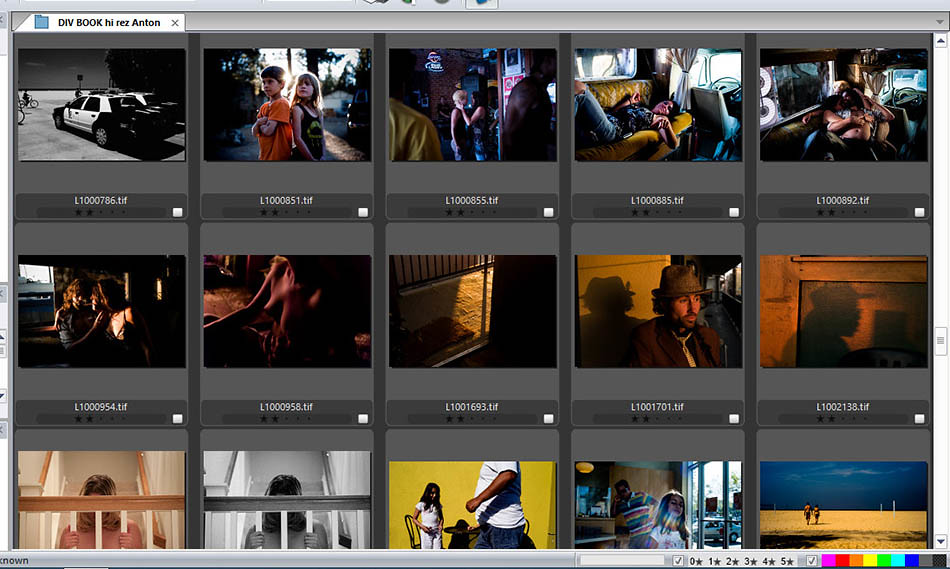
PANOS:
No. You just become them and you flow with people. Sometimes you have to do it…I think I’ve probably seen this photo two or three times before I photograph it. You see what I mean? Like it happened the previous month, too, probably but maybe with different people. It doesn’t matter, you have to give it as much time as needed for you to be trusted.
TID:
How does the chaos work with you now? Do you still feel the same chaos of when you were making the pictures? Has anything changed after finishing this book? I know it just came out.
PANOS:
Yeah, I learned that keeping a diary is a fantastic thing. The most honest pictures you can do, people will absolutely see it and they will reward you for that. And you will reward yourself for that, because you learn pretty much everything about who you are. That’s the therapy, like I didn’t have money to go to a real shrink in Beverly Hills, I guess. The camera became the shrink, because I would go home, see the results and ask all these questions, ‘Are they looking at me? What happened? Maybe not, or why did they even participate?’
Most of those people wanted to talk, but they talked easier in front of the camera by doing silly things for me that they might not even do. So the camera was helping them, too, to be actors and really - what do you when you’re acting? You’re trying to communicate something.
TID:
You said you asked yourself questions. What kind of questions would you ask?

PANOS:
Like first of all, ‘Why was I there in the first place?’ That’s how I started learning some of the things I needed to fix about me. Yeah of course. I learned to ask myself, ‘How can I make this now, and communicate with the rest of the world?’ And that made me ask the question, ‘Well why do you want to communicate with the rest of the world to begin with?’ And then I would realize, because I’m so alone, I think art will save my life. And then I laughed like everybody else, but I did it though. I realized that - you know what? It worked.
It really saved my life until today. I ended up believing, and you might laugh, that the years I was working around this particular book, I was so obsessed. Then I knew that I would do good pictures. I was so obsessed, it was stronger than any drug you could think of. That was my crack, to go down to the beach and find the right characters, if I could. Many nights it’s like fishing, you know nothing happens. And then I learned one of the most important things, you have to produce it if it doesn’t happen. You make it happen.
That doesn’t mean you fake it, you just poke them. And all these pirates and vampires, if you poke them, they will react. Then I really liked it, and then I became one of them. And when I became one of them, I did the best pictures.
TID:
What advice do you have for photographers?
PANOS:
You have to think of one word, and one word only, and that is authorship. If you really want to make other people get involved and really interested in your photography, and you want to grow into that, then it’s very very simple. First, you have to be absolutely honest with yourself. Do you want to get into the photo? Choose stories that only and only comes from your heart. Like for example, I’m not a war guy so you’re not going to see me very easily in Afghanistan, and I’m not going to lie about it. I admire everybody that does that.
So get honest with yourself, find what you can really feel comfortable and do it. Do the work. Most new photographers think, ‘Oh do I need to meet and rub my shoulders with this magazine and that, and get on the blogs and buy expensive workshops with big stars.’ You don’t really have to do any of that. Just get into the pictures yourself. Be honest. Photograph only the things you want, but in an obsessive way. Give us your authorship. Give us your vision.
You’re going to have a vision if you want to do all that. And don’t worry about it we will find you, that’s how it is.
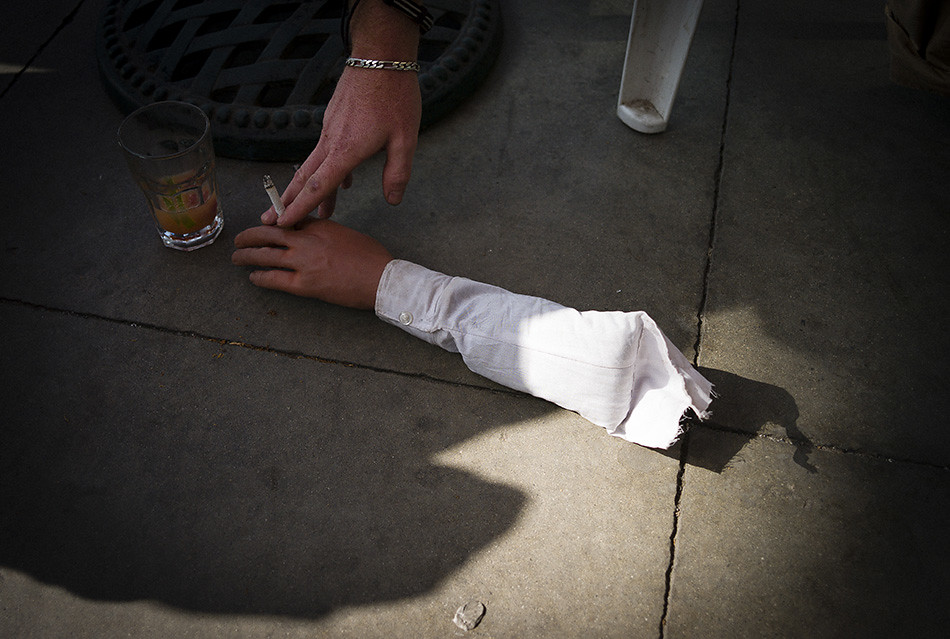
TID:
Thank you sir.
PANOS:
Thank you.
:::BIO:::
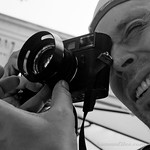
Panos Skoulidas is from Greece, and he began photography in Athens, and then immigrated to Los Angeles. Venice Beach became his life and unexpected inspiration. His work continues to explore real life and GONZO situations that place the everyday human condition at the center, giving a glimpse into lives that many would mistake for mundane. Panos' gift of learning and getting to know his photographic subjects creates an opportunity to capture the essence of a moment in their life as well as his own.
His latest book tabloid is "DEATH IN VENICE," published and produced by: burnmagazine.org and he is represented by IZ/FOTOGRAFEVI gallery/agency